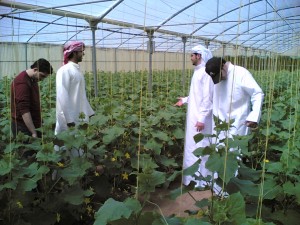Vivian Salama
DUBAI // The UAE is examining desert reclamation initiatives to boost its agriculture sector, a senior minister says.
Several research projects are also studying the best methods to fully utilise the land.
According to Rashid Ahmed bin Fahad, the Minister of Environment and Water, the UAE has reached 100 per cent self-sufficiency in production of dates and fish, 92 per cent self-sufficiency in dairy production, 32 per cent in vegetable cultivation and between 10 and 25 per cent self-sufficiency in meat and poultry production.
Agriculture accounted for only two per cent of the country’s GDP last year.
In the 1960s, the late Sheikh Zayed bin Sultan first launched massive tree-planting schemes designed to reduce soil erosion, protect crops from wind damage and beautify cities. Since 1966, more than 70 million acacia, eucalyptus and palm trees have been planted in the desert and the cities of Al Ain and Abu Dhabi.
In 2002, Sheikh Zayed spent Dh750 million (US$204m) to provide water needed for agricultural expansion within the country. Today, agricultural production stands at more than Dh2 billion per year, according to figures from the Ministry of Agriculture and Fisheries.
An average season yields a total of more than 600,000 tonnes of crops such as tomatoes, cucumbers, aubergines, lettuce, cabbages and animal feed.
Government-backed initiatives to plant shrubs and date palms, particularly on the UAE’s islands, have grown more aggressive in recent years as the rapidly rising population has forced the Government to push for greater self-sufficiency, particularly since only about six per cent of Abu Dhabi’s land is cultivated.
Farms and forests cover about 4.5 per cent of the UAE, and more than 200 of the UAE’s islands have been partially planted out. There are more than 6,000 greenhouses and 22,700 farms throughout the country, according to government statistics. Around the Liwa Oasis alone, more than 40,500 hectares of desert has been converted into cultivated land.
However, some experts believe that the emphasis should be on overseas agricultural investments as well as a boost in trade relationships, due to the unavoidable handicaps to agriculture. There is not a flowing river in the UAE, leaving irrigation reliant on scarce springs and recycled water.
According to Eckart Woertz, the programme manager of economics at the Gulf Research Center, the country’s population growth will continue to strain the already compromised agricultural capabilities. It would be best for the Government to set its sights on investing in agricultural projects abroad, he said.
“GCC countries definitely need to become investment players in this field,” said Mr Woertz. “Agriculture in the UAE is facing big problems because of water shortages, when you look 10 and 20 years from now.”
The country imports nearly 85 per cent of its food, relying heavily on overseas growers for staple items such as wheat, corn and rice. This poses a major challenge for all of the GCC countries, as their total population is set to double to nearly 60 million by 2030 from 30 million in 2000. Last year, the UAE imported $4bn of commodities and food, according to official statistics.
In an effort to boost the country’s strategic reserves, the Government of Abu Dhabi is now looking to agricultural investment projects in countries such as Pakistan, Kazakhstan and Egypt. The Government has agreed to buy 29,400 hectares of farmland in northern Sudan, with a project due to begin this year.
“Investment in agriculture is a good thing; boosting food stocks globally is a good thing; improving food security and improving availability of food in the region is a good thing – however it is not a complete solution,” said Abah Ofon, an agricultural commodities analyst for Standard Chartered Bank.
“Yes, investing in farmland and investing abroad is one way, and so is relying on international trade, but this is also about being more efficient with resources like water.”













